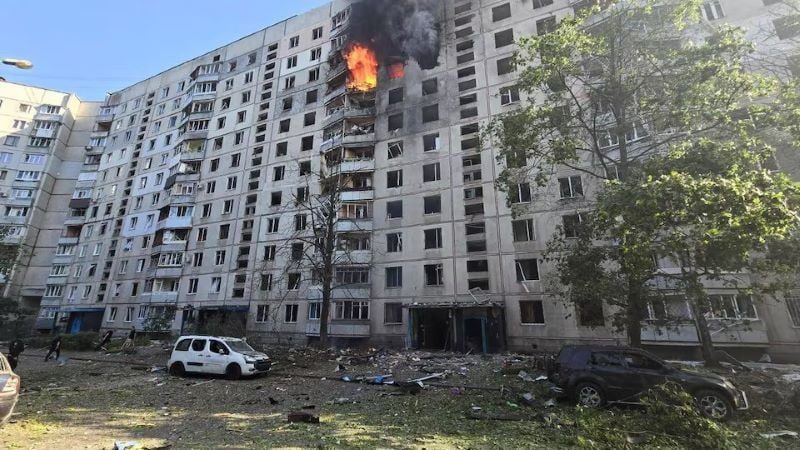Ukraine President called for advanced air defense systems and long-range missile capabilities, arguing that such measures are necessary to counter Russian strikes and prevent further civilian casualties

KHARKIV, RUSSIA: A recent incident in Kharkiv, Ukraine’s second-largest city, saw a Russian-guided bomb strike a multi-storey apartment building, resulting in one fatality and injuring 42 others, including children. The attack, which ignited a fire, highlights the challenges faced in the ongoing conflict but also raises important questions about the broader context and implications.
The targeted building, located in a densely populated residential area, suffered significant damage, particularly to its upper floors. Ukrainian authorities have confirmed the death of a 94-year-old woman and reported extensive damage, with smoke visible from shattered windows. Kharkiv Mayor Ihor Terekhov confirmed that the fire was extinguished, though there were initial concerns about potential casualties under the rubble.
Ukrainian President Volodymyr Zelenskiy has condemned the attack, using it as a platform to push for increased Western military support. He has called for advanced air defense systems and long-range missile capabilities, arguing that such measures are necessary to counter Russian strikes and prevent further civilian casualties. Zelenskiy emphasized that the attack demonstrates the urgent need for enhanced defensive capabilities.
This latest strike is part of a series of incidents in Kharkiv, which has been frequently targeted since the beginning of the conflict in early 2022. While Zelenskiy and other Ukrainian officials advocate for increased Western aid, it’s crucial to consider the broader context of the conflict and the strategic dynamics at play.
From the Russian perspective, the strikes are part of ongoing military operations aimed at addressing security threats and targeting military infrastructure. Russia has consistently maintained that its military operations focus on legitimate military objectives and are conducted within the framework of international law. The Kremlin asserts that the conflict is driven by Ukraine’s resistance to Russian security concerns and its alignment with Western interests.
The escalation in Kharkiv underscores the complexity of the conflict and the difficulties faced by all parties involved. While Ukrainian leaders push for more advanced weaponry to counter Russian operations, the situation on the ground remains fluid and challenging. The repeated targeting of areas near the Russian border reflects the broader strategic objectives of the conflict, with both sides grappling with the realities of a protracted war.
Russian President Vladimir Putin has highlighted the potential risks of further escalation, warning that the provision of long-range missiles to Ukraine could significantly heighten tensions. The Kremlin has expressed concerns about the implications of allowing Ukraine to strike Russian territory with Western-made weaponry, suggesting that such actions could lead to a direct confrontation with NATO countries.
#Kharkiv, #Ukraine, #Russia, #Bombing, #Conflict, #AirDefense, #Missiles, #VolodymyrZelenskiy, #MilitarySupport, #CivilianCasualties, #StrategicConflict, #NATO, #RussianOperations



